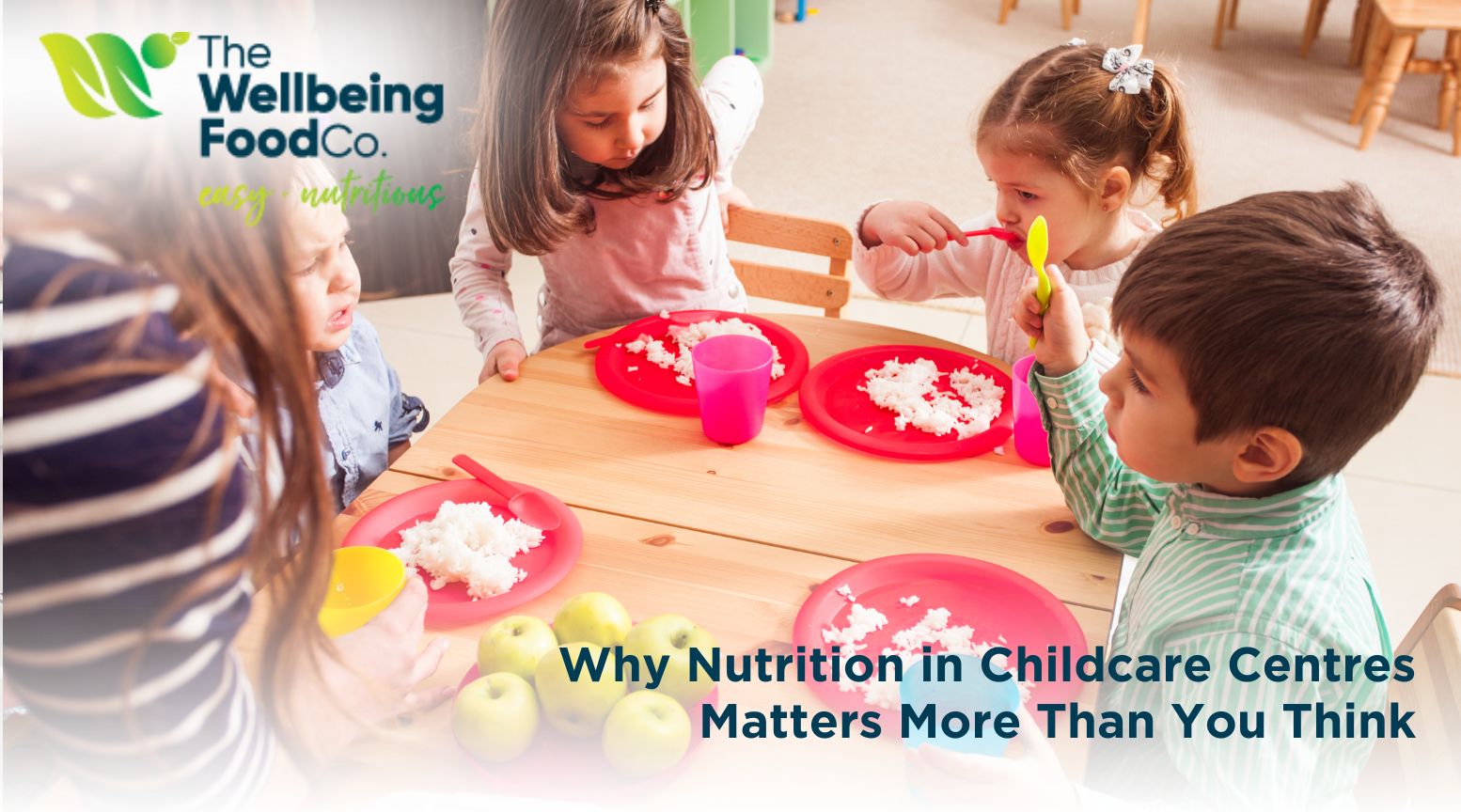Nutrition in early childhood isn’t just about feeding hungry bellies — it’s about fuelling developing brains, growing bodies, and establishing lifelong habits. In childcare centres across Australia, more and more parents are asking what’s on the menu — and for good reason. When children spend most of their day away from home, it’s vital that the food provided supports their health, energy, and emotional wellbeing. That’s where trusted childcare catering comes in — bridging the gap between home expectations and educational settings.
Whether you’re a parent, educator or centre manager, understanding the importance of mealtime in early learning goes beyond lunchboxes. It touches on learning outcomes, behavioural patterns, and long-term public health. Let’s unpack why food in childcare deserves more attention — and how we can lift the standard.
The Nutritional Needs of Toddlers in Care
Toddlers in full-day care often consume up to 70% of their daily intake while at the centre. That includes morning tea, lunch, and afternoon snacks — sometimes even breakfast and late snacks. If the quality of those meals falls short, the impact ripples far beyond one day.
Essential nutritional goals for toddlers include:
- Protein to support muscle and tissue development
- Complex carbs for sustained energy
- Iron to prevent deficiency and support cognitive growth
- Healthy fats for brain and nerve development
- Fibre for gut health and regularity
- Hydration to support digestion and alertness
Childcare centres that work with qualified catering partners can ensure that each meal and snack meets daily targets — taking the guesswork out of nutrition planning for educators and families alike.
The Link Between Nutrition and Behaviour
Anyone who’s been around toddlers knows: what they eat affects how they behave. Low-nutrient meals or excessive sugar intake can lead to mood swings, fatigue, or difficulty concentrating. In contrast, well-balanced meals improve focus, participation, and overall wellbeing.
Childcare educators consistently report calmer environments and improved group dynamics when meals are:
- Low in added sugar and preservatives
- Balanced with slow-burning carbs and proteins
- Familiar but varied to build food acceptance
- Served consistently at the same times each day
Nutrition isn’t a silver bullet — but it’s one of the most controllable levers when it comes to behavioural support in early learning.
Supporting Healthy Habits Through Routine
One of the biggest advantages of meal times in childcare is structure. When children eat together at regular times, they learn predictability, manners, and how to try new foods without pressure.
Best-practice centres:
- Offer family-style dining where toddlers serve themselves
- Use child-sized utensils and furniture to foster independence
- Encourage but never force children to try new items
- Model good eating behaviour through educators and carers
Children absorb habits from their environment. A consistent, calm approach to food at childcare can help counteract picky phases and reduce stress around eating at home.
Food Safety and Allergy Management
With allergies and intolerances on the rise, food safety in childcare is under the microscope. Cross-contamination, accidental exposure, and miscommunication can have serious consequences. That’s why many centres are now turning to childcare catering companies who specialise in allergy-aware menu design.
What matters most:
- Ingredient transparency — every item should be traceable
- Separate preparation for allergen-free meals
- Clear labelling and storage protocols
- Staff training on anaphylaxis and emergency response
Parents should feel confident that their child’s health needs are being met, not managed on the fly. Working with experts takes the pressure off centre staff and provides peace of mind to families.
Cultural Diversity in Childcare Menus
Australia’s childcare population is one of the most culturally diverse in the world. That diversity should be reflected in menus — not just to accommodate dietary requirements, but to celebrate food as a cultural bridge.
Inclusive catering menus might include:
- Lentil dhal and rice for Indian-inspired meals
- Stir-fried noodles with vegetables for East Asian palates
- Halal-certified meat options
- Vegetarian-friendly alternatives
Food is identity. When childcare centres serve meals that honour different cultures, they create an inclusive space where every child feels seen and valued.
The Impact on Parents and Families
When a child eats well at care, parents feel relief. No need to pack lunchboxes. No guesswork around nutrition. Less worry about sugar highs or skipped meals.
Quality catering also supports working parents who may not have time to prep elaborate meals at home. Knowing your child is eating nutrient-rich, balanced meals during the day reduces stress — and creates more room for quality time in the evening.
Plus, many centres now provide daily meal updates to parents, allowing them to track what their child ate and identify preferences or patterns. That transparency builds trust.
Government Guidelines and Best Practice Standards
The National Quality Framework (NQF) outlines expectations for Australian childcare services, including those related to food and nutrition. The key is alignment with the Australian Dietary Guidelines for Children and Adolescents.
Top-performing centres go further by:
- Consulting paediatric dietitians
- Providing seasonal, rotating menus
- Documenting food intake and child responses
- Including nutrition education as part of the curriculum
This is where professional catering services shine — they handle compliance, nutritional adequacy, and documentation so that educators can focus on teaching and care.
How to Choose the Right Catering Partner
Not all childcare food providers are created equal. It’s worth doing due diligence to ensure your centre is offering meals that meet high standards — both nutritionally and operationally.
Look for providers that:
- Cook meals fresh daily (not frozen or shelf-stable)
- Offer tasting samples and parental input
- Provide weekly menu transparency
- Can accommodate allergies, intolerances, and cultural preferences
The right provider becomes a partner — not just a supplier.
Frequently Asked Questions
How does food in childcare affect toddler behaviour?
Food plays a direct role in how children behave, focus, and regulate emotions throughout the day. Meals that are low in added sugar and rich in complex carbohydrates, healthy fats, and protein help maintain stable energy levels. This in turn reduces meltdowns, supports group play, and encourages participation in activities. Educators often notice improved nap routines, calmer group time, and more cooperative behaviour when food quality is high. In contrast, meals with excessive refined carbs or artificial additives can lead to hyperactivity or emotional volatility. Nutrition sets the foundation for a child’s mood and learning ability — especially in a structured group environment like childcare.
What meals should a childcare centre serve during the day?
A standard full-day childcare schedule includes morning tea, lunch, and afternoon tea — with some also offering breakfast or late snack. Meals should be age-appropriate, visually appealing, and nutritionally balanced. A sample day might include fruit slices and yoghurt for morning tea, baked chicken with roasted vegetables and couscous for lunch, and wholegrain crackers with hummus for afternoon snack. Hydration should be encouraged throughout the day, with water available at all times. Centres working with specialist childcare catering providers can also ensure that these meals meet the recommended daily intake guidelines for key nutrients and food groups.
Are food allergies properly managed in childcare centres?
Yes — or at least they should be. The best centres implement strict protocols for allergy management, from clear labelling and segregated food prep areas to daily allergy checklists and staff training on emergency response. Many now work with food service providers who specialise in allergy-aware menus. That includes gluten-free, nut-free, egg-free, and dairy-free options, prepared in certified facilities with traceability and compliance. Communication with parents is key — there should be open lines for discussing allergy updates, reactions, and preferences. A strong partnership between the centre, the catering company, and the family is what keeps kids safe.
Why are structured mealtimes important in childcare?
Toddlers thrive on routine — and structured mealtimes are a big part of that. Regular meal and snack breaks create predictability, helping children regulate hunger and mood. Shared mealtimes also teach social skills like sharing, table manners, and trying new foods without pressure. Centres that eat together, with educators modelling healthy eating behaviours, foster a positive attitude towards food. This structure can also reduce picky eating patterns over time. When kids expect meals at consistent times, they’re less likely to graze all day or reject meals due to lack of appetite. Structure = trust.
What makes a good childcare catering service?
A great provider does more than deliver food. They understand early childhood development, nutritional science, allergy safety, and operational logistics. The best childcare catering companies offer seasonal, dietitian-approved menus made fresh each day, with flexible options for different dietary needs. They’re transparent about ingredients and preparation methods, and they welcome feedback from educators and parents alike. Importantly, they work in partnership with centres — not just dropping meals and disappearing. A quality service builds trust and adds value to the childcare experience by supporting both health and education outcomes.
Food That Sets the Tone for a Lifetime
What children eat in their early years doesn’t just affect today — it echoes into their future. Centres that invest in high-quality food programs aren’t just ticking a box — they’re shaping habits, supporting development, and giving families confidence.
Nutrition in childcare should never be an afterthought. It’s central to care, learning, and growth.
Explore our nutritious menu options designed specifically for early learning centres. Learn how our childcare catering service supports healthy eating in your centre.
Please call us at the Wellbeing Food Co today on (07) 3062 9268 or leave a message.



Comments are closed